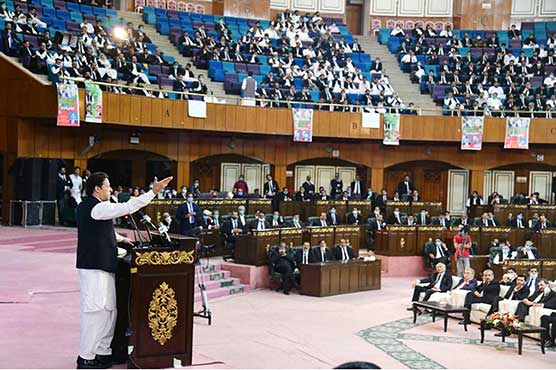All unemployed politicians have united against rule of law: PM Imran

The prime minister said he will not come under any pressure
ISLAMABAD (Dunya News) – Prime Minister Imran Khan on Friday said that all unemployed politicians, who do not believe in the rule of law, have united against the government.
Addressing the Insaaf Lawyers Forum at Convention Center on Friday, he said that these people want no one to touch them, adding that if the court announce verdict against them, they shout “mujhe kiun nikala” [Why I was removed from my seat as prime minister?].
“These people do not accept the decision of the Supreme Court,” he said.
The prime minister said he will not come under any pressure and will never National Reconciliation Ordinance (NRO) to the corrupt.
Lashing out at spokesperson for former prime minister Nawaz Sharif and Maryam Nawaz Muhammad Zubair for comparing the Pakistan Muslim League-Nawaz (PML-N) supremo to Iran s Supreme Leader Ayatollah Khomeini, Imran Khan said that Khomeini was sent abroad on gunpoint while Nawaz faked numerous illnesses go abroad.
"The PML-N looted the public money and his sons made huge properties abroad," the prime minister said.
He said that two were not similar as the people of Iran loved Ayatollah Khomeini, adding that the Iranian supreme leader did not have niharis brought to him on helicopters from Lahore.
PM Imran said that Minister for Human Rights Shireen Mazari burst into tears when the federal cabinet was told that Nawaz Sharif was suffering from multiple diseases.
Imran Khan said Nawaz Sharif was in fact promoting the agenda of India by maligning the Pakistan Army, ignoring the situation of countries like Libya, Somalia and Yemen faced in the absence of a strong military.
“I don’t have any problem with the army because it supports our manifesto and has effectively assisted the government during the situation like COVID-19 and Karachi rains,” he said.
Referring to Nawaz Sharif’s statement that the then Inter-Services Intelligence chief had demanded resignation from him, he said, “If this is so, why he remained silent. This is because that he knew of his involvement in corruption.”
The prime minister mentioned that Pakistan was at the tipping point after two difficult years of dealing with economy nearing the verge of collapse.
“Do as many Jalsas (public gatherings) as you want, but remember that in case of violating law, you will be put in an ordinary and not a VIP jail,” he warned the politicians, who had gathered at a platform to save their corruption.
The prime minister said the “coalition of dacoits” was opposing the government as it was heading towards making the country financially strong and stable. He said the opposition parties made every tactic to get the country blacklisted by the Financial Action Task Force (FATF) as they pressured the government to carry out 34 amendments in the National Accountability Bureau law.
He said the country witnessed success in areas particularly overcoming the challenge of COVID-19 and unprecedented rise of sale of cement in last month showing growing economic activity.
Prime Minister Imran Khan said the rule of law was the basic principle of State of Madina, and the lawyers should follow such values during their professional duties and become future leaders by pursuing politics.
He announced that health cards would be introduced for medical treatment of lawyers and they would also be accommodated in the Naya Pakistan Housing Project, aimed at providing low cost houses.
ILF Chairman Barrister Syed Ali Zafar said the lawyers had always stood by democracy and justice following the principles as championed by Founder of Pakistan Quaid-e-Azam Muhammad Ali Jinnah, also a renowned lawyer of his time.
He said the government of Imran Khan was aware of the importance of people in a democracy and thus was following a people-centric approach in governance.
He said winning a war against terror by the Pakistani people was a ‘striking example of a resilient and brave nation that never compromised on its integrity and sovereignty.
Stressing the importance of social justice and equity for all, Barrister Zafar mentioned the government’s priorities in health and education with the recent strategy to tackle COVID-19 and the upcoming programme of universities to promote scientific education. He called upon the lawyers’ fraternity to be responsible in “putting their own house in order to reform the judiciary” and adopt the principles of professionalism.
Advocate General Ahmed Awais spoke about the rule of law as the hallmark of State of Madina that needed to be replicated for a revolution in the society.

